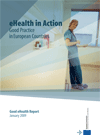 Good eHealth Report, January 2009.
Good eHealth Report, January 2009.Good eHealth - Exchange of Good Practices in eHealth - is a three-year study (2006-2008) funded under the former Modinis programme by the Directorate-General Information Society and Media. This report presents case studies from 30 European countries for which validated information was available to the project by the end of November 2008. This information reflects the situation of the cases at the date of delivery to the project by national correspondents during the time period 2006-2008.
The objectives of this study are to:
- identify good practices and their associated benefits
- develop and implement proven approaches to wider dissemination and transfer real-life experiences
- stimulate accelerated take-up of eHealth by addressing common implementation challenges and lessons learned.
The report is the outcome of research in the context of the Good eHealth project, implemented in cooperation between Deloitte Belgium and empirica Communication and Technology Research, Germany. The Good eHealth project is commissioned by the European Commission, DG Information Society and Media, ICT for Health Unit.
Download eHealth in Action Good Practice in European Countries Report (.pdf, 2.280 KB).
Download from the eHealthNews.EU Portal's mirror: eHealth in Action Good Practice in European Countries Report (.pdf, 2.280 KB).
For further information, please visit:
http://www.good-ehealth.org/
Related news articles:
- empirica's Profile
About empirica
empirica Gesellschaft für Kommunikations- und Technologieforschung mbH (empirica) has many years of experience in quantitative and qualitative research methods. Its clients are private companies and public bodies: large and medium-sized companies in the insurance, pharmaceutical and automobile industries as well as software developers and hardware manufacturers. There are also telecommunications service companies and network providers, social services firms, medical facilities, Federal and State Government ministries in Germany and the European Commission as well as the European statistical office (Eurostat). For further information, please visit www.empirica.com.